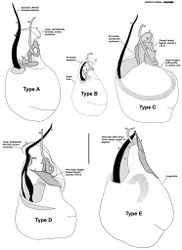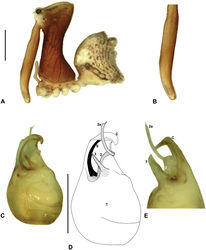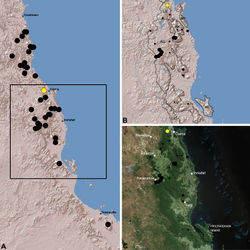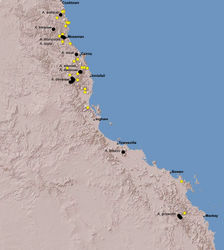Austrarchaea westi
| Notice: | This page is derived from the original publication listed below, whose author(s) should always be credited. Further contributors may edit and improve the content of this page and, consequently, need to be credited as well (see page history). Any assessment of factual correctness requires a careful review of the original article as well as of subsequent contributions.
If you are uncertain whether your planned contribution is correct or not, we suggest that you use the associated discussion page instead of editing the page directly. This page should be cited as follows (rationale):
Citation formats to copy and paste
BibTeX: @article{Rix2012ZooKeys218, RIS/ Endnote: TY - JOUR Wikipedia/ Citizendium: <ref name="Rix2012ZooKeys218">{{Citation See also the citation download page at the journal. |
Ordo: Araneae
Familia: Archaeidae
Genus: Austrarchaea
Name
Austrarchaea westi Rix & Harvey sp. n. – Wikispecies link – ZooBank link – Pensoft Profile
Vernacular name
Lamb Range Assassin Spider
Type material
Holotype male: Mount Williams, [Dinden National Park], 16°55'S, 145°40'E, pyrethrum, trees and logs, 1000 m, 2.XII.1993, G. Monteith, H. Janetzki (QMB S59537).
Other material examined. AUSTRALIA: Queensland: Dinden National Park: same data as holotype, 1 juvenile (QMB S59537).
Etymology
The specific epithet is a patronym in honour of Paul West, for his friendship to MSH over many years, and for helping fund the Western Australian Museum’s ‘archaeid project’ from 2009–2012.
Diagnosis
Austrarchaea westi can be distinguished from all other Archaeidae from north-eastern Queensland by the presence of a unique Type B pedipalp (Fig. 6), with very small bulb (width << 0.30 mm) (Figs 6, 12D), and by the relatively short embolus, which is distally enclosed within the conductor (Figs 6, 12D). This species can be further distinguished by the very short, barely differentiated accessory setae on the male chelicerae (Fig. 12B).
Description
Holotype male: Total length 3.13; leg I femur 3.23; F1/CL ratio 2.65. Cephalothorax reddish-brown; legs beige with darker annulations; abdomen mottled grey-brown and beige, with darker brown dorsal scute and sclerites (Fig. 12A). Carapace tall (CH/CL ratio 2.15); 1.22 long, 2.62 high, 1.13 wide, ‘neck’ 0.65 wide; bearing two pairs of rudimentary horns; highest point of pars cephalica (HPC) approaching posterior quarter of ‘head’ (ratio of HPC to post-ocular length 0.71), carapace gently sloping posterior to HPC; ‘head’ not strongly elevated dorsally (post-ocular ratio 0.27). Chelicerae with very short, barely differentiated accessory setae on anterior face of paturon (Fig. 12B). Abdomen 1.65 long, 1.10 wide; with two pairs of dorsal hump-like tubercles (HT 1-4); dorsal scute fused anteriorly to epigastric sclerites, extending posteriorly to first pair of hump-like tubercles; HT 3-4 each covered by separate dorsal sclerites. Unexpanded pedipalp (Figs 12C-E) of Type B morphology (Fig. 6), very small in size (width of bulb << 0.30), with large, retrolaterally directed, arched conductor; embolus curved, distally enclosed within conductor, without spur; tegular sclerite 3 (TS 3) porrect, spur-like, with pointed, pro-distally directed apex; TS 2-2a looped over retrolateral edge of conductor, TS 2 not strongly developed distally, TS 2a projecting beyond distal rim of conductor; TS 1 very small, obscured by TS 2-3, not visible in ventral view.
Female: Unknown.
Distribution and habitat
Austrarchaea westi is known only from Mount Williams, on the Lamb Range 11 km west of Cairns (Figs 21, 25). The two known specimens were collected in high altitude tropical rainforest.
Conservation status
Unknown (data deficient).
Original Description
- Rix, M; Harvey, M; 2012: Australian Assassins, Part III: A review of the Assassin Spiders (Araneae, Archaeidae) of tropical north-eastern Queensland ZooKeys, 218: 1-50. doi
Images
|



